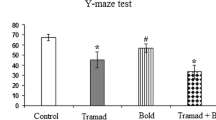Abstract
The neurotoxin l-trichloromethyl-l,2,3,4-tetrahydro-β-carboline (TaClo) has been reported, both in vitro and in vivo models, to produce neurodegeneration and parkinsonian symptoms after prolonged exposure in rats. The aim of the present study was to investigate the effects of TaClo on the cognitive performance of rats. We used the COGITAT hole board system where rats can find hidden pellets by exploring the board. TaClo-treated rats found as many pellets as control rats treated with saline. Furthermore, their search was as efficient as that of control animals since there were no differences between the groups regarding explorative activity, visits to nonbaited holes and time needed to find the pellets. These results suggest that there is no deficit in spatial memory following the chronic administration of TaClo to rats.
Access this chapter
Tax calculation will be finalised at checkout
Purchases are for personal use only
Preview
Unable to display preview. Download preview PDF.
Similar content being viewed by others
References
Alexander GE, DeLong MR, Strick PL (1986) Parallel organization of functionally segregated circuits linking basal ganglia and cortex. Annu Rev Neurosci 9: 357–381
Bjorklund A, Lindvall O (1984) Dopamine-containing systems in the CNS. In: Bjorklund A, Hokfelt T (eds), Handbook of chemical neuroanatomy, Vol 2. Elsevier, Amsterdam, pp 55–122
Bringmann G, Feineis D, God R, Peters K, Peters EM, Scholz J, Riederer F, Moser A (2002) l-Trichloromethyl-1,2,3,4-tetrahydro-beta-carboline (TaClo) and related derivatives: chemistry and biochemical effects on catecholamine biosynthesis. Bioorg Med Chem 10: 2207–2214
Bringmann G, God R, Feineis D, Janetzky B, Reichmann H (1995) TaClo as a neurotoxic lead: improved synthesis, stereochemical analysis, and inhibition of the mitochondrial respiratory chain. J Neural Transm Suppl 46: 245–254
Brown RG, Marsden CD (1988) Internal versus external cues and the control of attention in Parkinson’s disease. Brain 111(2): 323–345
Brozoski TJ, Brown RM, Rosvold HE, Goldman PS (1979) Cognitive deficit caused by regional depletion of dopamine in prefrontal cortex of rhesus monkey. Science 205: 929–932
DeLong MR (2000) Functional and pathophysiological models of the basal ganglia: therapeutic implications. Rinsho Shinkeigaku 40: 1184
Divac I, Rosvold HE, Szwarcbart MK (1967) Behavioural effects of selective ablation of the caudate nucleus. J Comp Physiol Psychol 63: 184–190
Gerlach M, Xiao AY, Heim C, Lan J, God R, Feineis D, Bringmann G, Riederer P, Sontag KH (1998) l-Trichloromethyl-l,2,3,4-tetrahydrobeta-carboline increases extracellular serotonin and stimulates hydroxyl radical production in rats. Neurosci Lett 257: 17–20
Heim C, Pardowitz I, Sieklucka M, Kolasiewicz W, Sontag T, Sontag KH (2000) The analysis system COGITAT for the study of cognitive deficiencies in rodents. Behav Res Methods Instrum Comput 32: 140–156
Janetzky B, God R, Bringmann G, Reichmann H (1995) 1-Trichloromethyl-1,2,3,4-tetrahydro-beta-carboline, a new inhibitor of complex I. J Neural Transm Suppl 46: 265–273
Javoy-Agid F, Agid Y (1980) Is the mesocortical dopaminergic system involved in Parkinson disease? Neurology 30: 1326–1330
Kochen W, Kohlmuller D, De Biasi P, Ramsay R (2003) The endogeneous formation of highly chlorinated tetrahydro-beta-carbolines as a possible causative mechanism in idiopathic Parkinson’s disease. Adv Exp Med Biol 527: 253–263
Lange KW, Paul GM, Naumann M, Gsell W (1995) Dopaminergic effects on cognitive performance in patients with Parkinson’s disease. J Neural Transm Suppl 46: 423–432
Lange KW, Robbins TW, Marsden CD, James M, Owen AM, Paul GM (1992) L-dopa withdrawal in Parkinson’s disease selectively impairs cognitive performance in tests sensitive to frontal lobe dysfunction. Psychopharmacology (Berl) 107: 394–404
Middleton FA, Strick PL (2000) Basal ganglia output and cognition: evidence from anatomical, behavioural, and clinical studies. Brain Cogn 42: 183–200
Pahwa R, Paolo A, Troster A, Koller W (1998) Cognitive impairment in Parkinson’s disease. Eur J Neurol 5: 431–441
Pothos EN, Hernandez L, Hoebel BG (1995) Chronic food deprivation decreases extracellular dopamine in the nucleus accumbens: implications for a possible neurochemical link between weight loss and drug abuse. Obes Res3 Suppl 4: 525S–529S
Rausch WD, Abdel-mohsen M, Koutsilieri E, Chan WW, Bringmann G (1995) Studies of the potentially endogenous toxin TaClo (1-trichloromethyl-l,2,3,4-tetrahydro-beta-carboline) in neuronal and glial cell cultures. J Neural Transm Suppl 46: 255–263
Riederer P, Foley P, Bringmann G, Feineis D, Bruckner R, Gerlach M (2002) Biochemical and pharmacological characterization of 1-trichloromethyl-l,2,3,4-tetrahydro-beta-carboline: a biologically relevant neurotoxin? Eur J Pharmacol 442: 1–16
Sontag KH, Heim C, Sontag TA, God R, Reichmann H, Wesemann W, Rausch WD, Riederer P, Bringmann G (1995) Long-term behavioural effects of TaClo ( 1-trichloromethyl-1,2,3,4-tetrahydro-beta-carboline) after subchronic treatment in rats. J Neural Transm Suppl 46: 283–289
Taylor AE, Saint-Cyr JA (1995) The neuropsychology of Parkinson’s disease. Brain Cogn 28: 281–296
Zgaljardic DJ, Borod JC, Foldi NS, Mattis P (2003) A review of the cognitive and behavioural sequelae of Parkinson’s disease: relationship to frontostriatal circuitry. Cogn Behav Neurol 16: 193–210
Author information
Authors and Affiliations
Editor information
Editors and Affiliations
Rights and permissions
Copyright information
© 2007 Springer-Verlag Printed in Austria
About this paper
Cite this paper
Sontag, T.A., Lange, K.W., Heim, C., Kolasiewicz, W., Tucha, O., Sontag, KH. (2007). The long-term effects of the neurotoxin l-trichloromethyl-1,2,3,4-tetrahydro-β-carboline (TaClo) on cognitive performance in rats. In: Gerlach, M., Deckert, J., Double, K., Koutsilieri, E. (eds) Neuropsychiatric Disorders An Integrative Approach. Journal of Neural Transmission. Supplementa, vol 72. Springer, Vienna. https://doi.org/10.1007/978-3-211-73574-9_18
Download citation
DOI: https://doi.org/10.1007/978-3-211-73574-9_18
Publisher Name: Springer, Vienna
Print ISBN: 978-3-211-73573-2
Online ISBN: 978-3-211-73574-9
eBook Packages: MedicineMedicine (R0)




